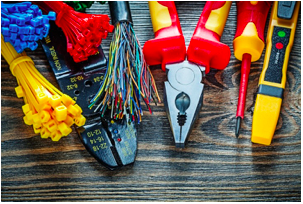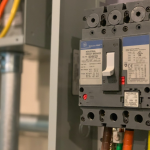It’s okay to admit that you are intimidated by any jobs around the home that mess with your electrical system. Though it’s been coursing through homes for well over a century, electricity remains mystifying to most homeowners, who are terrified by the idea of receiving a life-threatening shock or starting a house fire.
Generally, it’s a good idea to hire a certified electrician for bigger electrical jobs around your house. Projects that necessitate professional help include anything for which you acquired a permit or which will be inspected as well as anything for which you lack the right tools or knowledge.
However, there are plenty of electrical jobs you can do yourself — as long as you know how to avoid the pitfalls of working with electricity. DIY electrical projects will save you time and money, and they will ensure you keep your electrical system in good, working order. You can find a more extensive explanation of everyday electrical safety tips here — https://www.ahs.com/home-matters/quick-tips/electrical-safety-tips-for-your-home/ — this guide will give you a rundown of tips for staying safe during electrical projects around your home.
Wear Rubber
There are materials that electricity easily travels through, like metal and water, and there are materials that stop electricity in its tracks. This latter category is labeled non-conductive, and its poster child is rubber. Unlike conductive materials, the molecules that make up rubber lack loose electrons, which means electrical current has no means of flowing from one atom to the next. Wearing rubber gloves and rubber-soled shoes will keep you insulated from any errant electricity, but it’s a good idea to remove from your person any conductive materials, like jewelry or electrical devices.
Learn Your Breakers
No two circuit breakers are alike, so it’s important that you get to know your breakers as soon as you move into a new space. Usually, breakers are poorly labeled if they are at all, so it’s worth your time to shut breakers off individually and survey your home to understand the extent of each circuit. Then, in an emergency, you can immediately shut off the appropriate breaker to avoid doing damage to your electrical system.
If you have an old-fashioned fuse box instead of circuit breakers, you might consider paying to replace the panel with a set of breakers. Breakers are advantageous because they are easier and safer to use, and they are reusable unlike fuses, which need to be replaced when they are tripped. If you don’t like the idea of dealing with fuses, breakers are a worthwhile upgrade.
Once you know your breaker box a little better, you should be able to identify the main breaker, which controls electricity to all the circuits in your home. Before you open up your panel to see the wiring behind, you should shut off the main breaker. Regardless of whether you have a breaker box or fuses, there are a few safety tips for messing around inside your electrical panel. For example, you should avoid touching and moving wires, and you should never come into contact with the main feeders that provide electricity to the panel. In fact, it is wise to avoid sticking your hands inside the panel at all; a visual inspection should be enough to tell you if there is something screwy behind your breakers or fuses.
Turn Electricity off
Turning electricity off isn’t just a good idea when you are cracking into your electrical panel; it’s also wise to shut off the appropriate circuit whenever you are performing electrical work within your home. Even a job as simple as unscrewing an outlet cover could turn bad if electricity is still coursing through the walls; your screwdriver could slip into the outlet and cause severe injury or death. Catastrophe is even more likely if you are doing something like installing a light fixture or replacing an outlet. It doesn’t take long to turn the electricity off, and it could save your life.
Avoid Wet Spots

Water is one of the best conductors of electricity — which is why the human body is so susceptible to shocks. That’s why your parents always made you leave the pool or lake when you saw lightning in the sky, and it’s why you should avoid any type of excess moisture in the area where you work with electricity. Standing in a puddle of water while tinkering with a live outlet is a good way to receive a life-threatening shock, but other sources of wet can also be dangerous. For instance, you should ensure your hands are dry, and you should avoid working with electricity in a cold or steamy room, where condensation might form.
When you are working with electricity and you hear a buzzing, see sparks or smell something burning, your first instinct should be to turn off all electricity to your home using the main breaker and call in an expert. Saving some money isn’t worth risking your life or doing lasting damage to your home.










